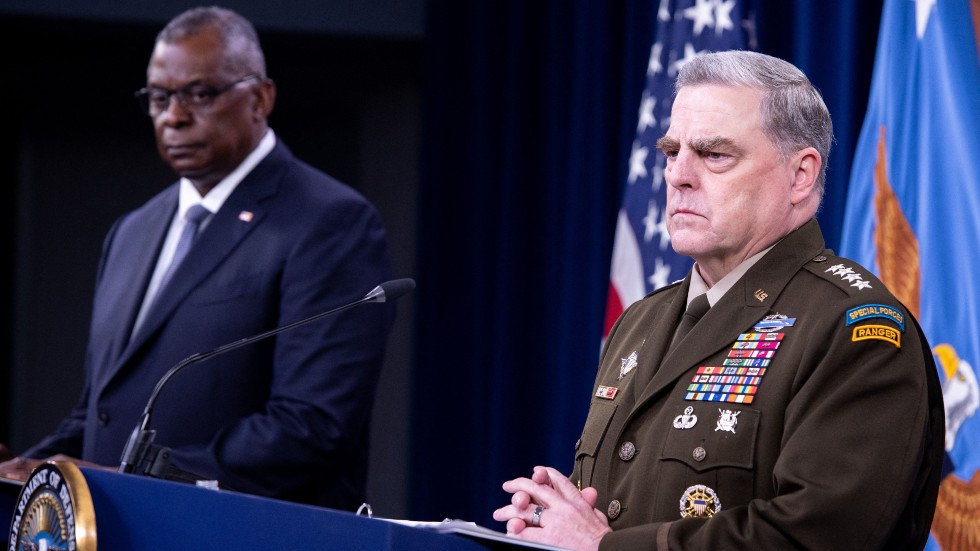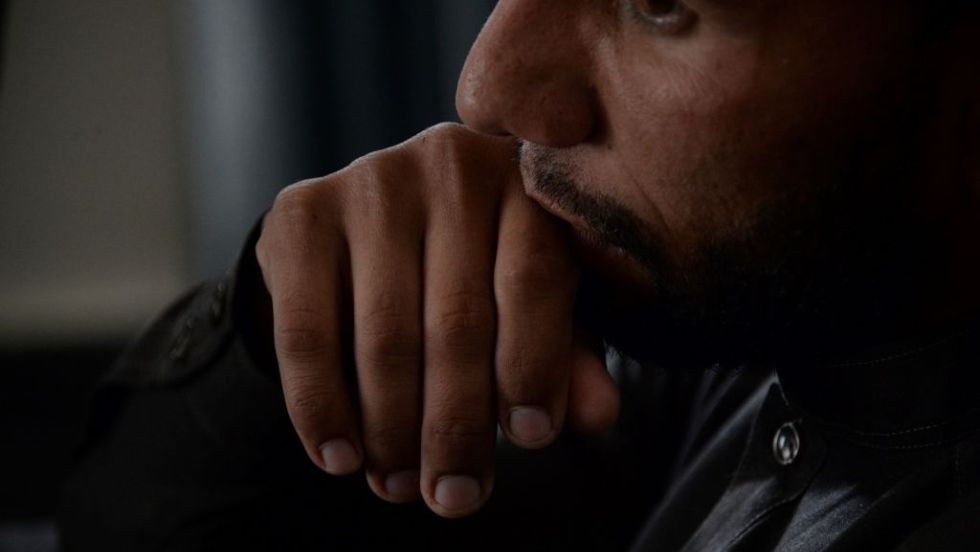Overnight Defense & National Security — Defense bill brawl barreling on
It’s Wednesday, welcome to Overnight Defense & National Security, your nightly guide to the latest developments at the Pentagon, on Capitol Hill and beyond. Subscribe here: digital-staging.thehill.com/newsletter-signup.
The House Armed Services Committee’s defense bill markup is still going strong, with a couple major debates already in the rearview but more expected later in the night.
The Pentagon’s top brass made their first appearance in the briefing room since the U.S. war in Afghanistan ended Monday.
And a fuller picture is emerging of just how many Afghan allies were left out of the evacuations.
For The Hill, we’re Ellen Mitchell and Rebecca Kheel. Write to us with tips: emitchell@digital-staging.thehill.com and rkheel@digital-staging.thehill.com.
Let’s get to it.
HASC’s big day

The House Armed Services Committee (HASC) is in the midst of its marathon markup of the annual National Defense Authorization Act (NDAA).
The panel flew through the subcommittee parts of the bill, saving the most controversial amendments for the full committee portion of the legislation.
We’ll stay tuned throughout the night, so be sure to check TheHill.com for updates, but here’s a few highlights so far.
Dems buck Biden on budget: With 14 Democrats siding with Republicans, the panel approved an amendment to add $25 billion to President Biden’s proposed defense budget.
The committee approved the amendment — offered by ranking member Rep. Mike Rogers (R-Ala.) — in a 42-17 vote.
The amendment would authorize a fiscal 2022 defense budget of $778 billion, which is $37 billion more than approved for this year and $25 billion more than Biden asked for next year.
Republicans have been arguing the higher dollar figure is needed to counter China, and several Democrats with national security backgrounds or in vulnerable districts agreed.
Progressives, though, are now fuming that despite Democrats controlling both chambers of Congress and the White House, a major defense budget hike appears on track to becoming reality.
National Guard: You may recall the row earlier this year from when South Dakota Gov. Kristi Noem (R) deployed her state’s National Guard to the U.S.-Mexico border using funding from a private donor.
In response to that, the committee approved an amendment Wednesday from Rep. Veronica Escobar (D-Texas) that would ban states from using private funds to pay for Guard deployments.
Some Republicans spoke out against the amendment, but it was ultimately approved by voice vote.
Afghanistan: A couple noncontroversial Afghanistan amendments were approved early in the day, including requirements for quarterly reports on the security situation in Afghanistan and threats posed by al Qaeda.
Some Republicans also used their opening statements to hit Biden over the Afghanistan withdrawal.
But expect a whole lot more on this topic as the night goes on, as Republicans have promised to bring up dozens of Afghanistan-related amendments.
Austin, Milley reflect on end of withdrawal

Speaking of Afghanistan, Defense Secretary Lloyd Austin and Chairman of the Joint Chiefs of Staff Gen. Mark Milley made their first public comments Wednesday since the withdrawal ended earlier this week.
In a reflective moment, Milley acknowledges the “pain and anger” and other “conflicted” feelings those who served in the war feel right now.
“War is hard. It’s vicious, it’s brutal, it’s unforgiving,” Milley said. “And yes, we all have pain and anger. And when we see what has unfolded over the last 20 years and over the last 20 days, that creates pain and anger. And mine comes from 242 of my soldiers killed in action over 20 years in Iraq and Afghanistan.
“So, yeah, I have that,” he continued. “But I’m a professional soldier. I’m going to contain my pain and anger and continue to execute my mission.”
No operation ‘perfect’: Austin, when pressed on whether the Pentagon could have done anything differently to avoid the chaos at the end, held that “no operation is ever perfect” but promised an after-action review.
“There hasn’t been a single operation that I’ve ever been involved in where we didn’t discover that there’s something that we could have done better or more efficiently or more effectively,” he said. “And I’d also say that no operation is ever perfect. I will tell you that we will do what we always do and that is to look at ourselves and do after-action reviews, and we want to make sure that we learn every lesson that can be learned from this experience.”
TALIBAN COUNTERTERRORISM COOPERATION?
Intriguingly, Milley on Wednesday also raised the prospect of coordinating with the Taliban on future strikes against the Afghan branch of ISIS, which is a sworn enemy of the Taliban.
Asked whether the United States could coordinate with the Taliban against ISIS-K, Milley said, “it’s possible.”
Austin did not go quite as far, though.
“I would not want to make any predictions,” Austin said. “I would tell you that we’re going to do everything that we can to make sure we remain focused on ISIS-K, understand that network, and at the time of our choosing in the future, hold them accountable for what they’ve done.”
Evacuation cooperation was ‘very narrow’: During the evacuation, U.S. commanders communicated daily with the Taliban.
But Austin on Wednesday stressed that “we were working with the Taliban on a very narrow set of issues” and cautioned against reading into that coordination to predict future relations.
“I would not make any leaps of logic to broader issues.” Austin said. “It’s hard to predict where this will go in the future with respect to the Taliban.”
“We don’t know what the future of the Taliban is, but I can tell you from personal experience that this is a ruthless group, from the past, and whether or not they change remains to be seen,” Milley added. “As far as our dealings with them at that airfield or in the past year or so, in war, you do what you must in order to reduce risk to mission and force, not what you necessarily want to do.”
MILLEY ACKNOWLEDGES DRONE STRIKE DEATHS
Milley also acknowledged that while at least one person killed in Sunday’s drone in Kabul was an ISIS facilitator, “others” were slain.
“We had very good intelligence that ISIS-K was preparing a specific-type vehicle at a specific-type location,” Milley said. “We monitored that through various means, and all of the engagement criteria were being met. We went through the same level of rigor that we’ve done for years.”
“We know from the variety of other means that at least one of those people that were killed was a ISIS facilitator,” he added. “Were there others killed? Yes, there are others killed. Who they are, we don’t know. We’ll try to sort through all that. But we believe that the procedures at this point — I don’t want to influence the outcome of an investigation — but at this point we think that the procedures were correctly followed and it was a righteous strike.”
Anguish for those left behind

American and Afghan allies left behind in Afghanistan have entered a fraught and uncertain period of limbo following the definitive conclusion of U.S. military evacuations out of the country.
Advocates estimate roughly 150,000 vulnerable Afghans still remain in the country after a U.S. evacuation effort ended early Tuesday, while those who assisted the U.S. military who may now wish to leave with their families could add another 100,000.
Many who remain have gone into hiding over fear of violent retribution by the Taliban, likely targeted for work alongside American and coalition forces that battled and killed members of the Islamic-fundamentalist group over two decades of war.
Confusion and fear: These groups of people face overwhelming confusion and fear over how to leave the country, from practical matters of appropriate travel documents and questions over when airports will reopen and how they will function — to the uncertainty of whether the Taliban will respond to international pressure to ensure safe passage.
“The last few months have been incredibly challenging and disappointing for our clients, whose risk has increased exponentially with the Taliban takeover of Afghanistan,” Adam Bates, policy counsel with the International Refugee Assistance Project told reporters, noting that “the majority of our clients were not able to leave Afghanistan on an evacuation flight.”
Who was left behind?: Out of more than 500 clients the International Refugee Assistance Project was trying to get out of the country, only about 130 were able to make it onto flights. Just a few dozen have made it onto U.S. soil.
Rabbi Will Berkowitz, CEO of the refugee resettlement organization Jewish Family Services, said that group has 127 people on the ground in Afghanistan — 23 families that qualify for Special Immigrant Visas (SIV) to the U.S. who were left behind in the evacuations.
The organization is gaming whether people can evacuate over land routes, but is distraught over whether access to cash and communication may be cut off at any moment. They have advised the people to stay in hiding over the next few days as the situation unfolds.
The New York-based Women for Afghan Women was unable to secure evacuation for 500 of its most vulnerable staff. This group qualified for evacuation and refugee status for their association with a U.S.-government funded organization.
Also left in Afghanistan are an estimated 150 journalists working for the Voice of America and Radio Free Europe/Radio Liberty, media outlets funded by the American government. That group numbers 500 people including their families, according to a congressional aide.
PRACTICAL ISSUES
Also unclear are the nuts and bolts of facilitating travel, from identity documents to finding safe areas of transit.
“This is an area of limbo that is extraordinary. If you chase any of the trails, it goes into an area you can’t even imagine,” a former senior State Department official told The Hill.
“The United Nations can offer a stateless person a passport, but they’re not geared up to do any of that right now,” the official continued. “Then what we have are people trying to leave by land borders, where there might be a few more options, including in all of these cases, bribery. There are people making money off of this misery right and left.”
State Department spokesperson Ned Price said the U.S. had assessed that Kabul’s Hamid Karzai International Airport can support resuming commercial operations.
But up in the air is how the Taliban will go about assigning responsibility for security and technical operations, possibly with the assistance of Qatar and Turkey.
ON TAP FOR TOMORROW
-
Rep. Jared Golden (D-Maine) will discuss the future of the Navy and Marine Corps at a virtual Hudson Institute event at noon. https://bit.ly/3BwbbGU
-
Sen. Brian Schatz (D-Hawaii) will discuss the U.S.-South Korea alliance, North Korea and the Korean American community with the Center for Strategic and International Studies at 4:30 p.m. https://bit.ly/3gQk85N
WHAT WE’RE READING
- Romney blasts Biden over those left in Afghanistan: ‘Bring them home’…
- Biden likely to lean on drone warfare in Afghanistan…
- Progressives breathe sigh of relief after Afghan withdrawal…
- Opinion: The lessons of Afghanistan are usually learned too late
- Task and Purpose: US troops gave the Taliban and ISIS the middle finger in messages left at Kabul airport
- Reuters: ‘Everybody screwed up’: Blame game begins over turbulent U.S. exit from Afghanistan
That’s it for today. Check out The Hill’s defense and national security pages for the latest coverage. We’ll see you Thursday.
Copyright 2024 Nexstar Media Inc. All rights reserved. This material may not be published, broadcast, rewritten, or redistributed..













